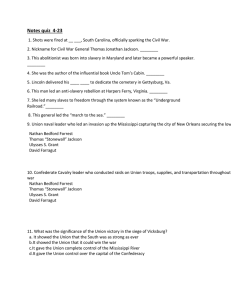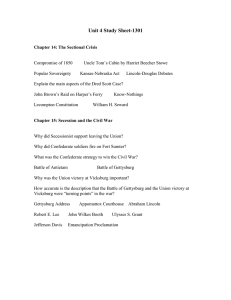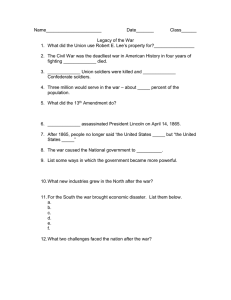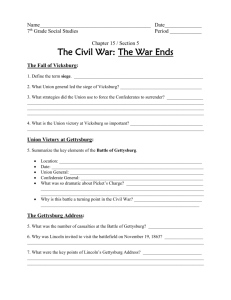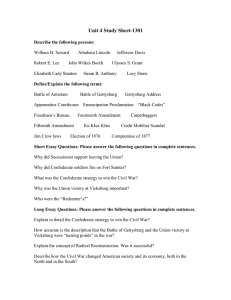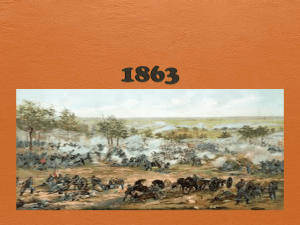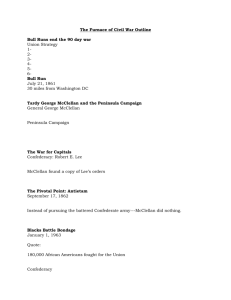Do now: Open your blue book to page 450... questions 1-2 using the organizer provided. (I will only
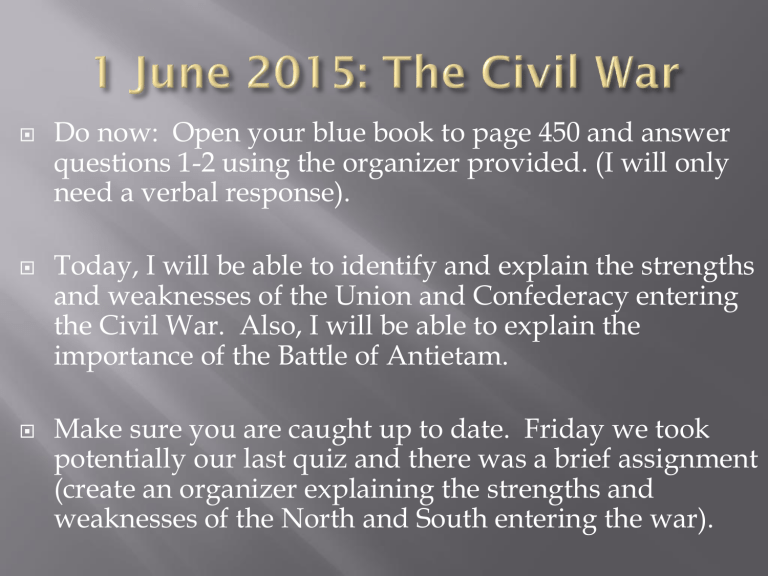
Do now: Open your blue book to page 450 and answer questions 1-2 using the organizer provided. (I will only need a verbal response).
Today, I will be able to identify and explain the strengths and weaknesses of the Union and Confederacy entering the Civil War. Also, I will be able to explain the importance of the Battle of Antietam.
Make sure you are caught up to date. Friday we took potentially our last quiz and there was a brief assignment
(create an organizer explaining the strengths and weaknesses of the North and South entering the war).
Union (aka “the North”) strengths:
Larger population (more potential soldiers) 4xs as many free citizens
More industry, 90% of industry
More than 3/5 th of the country’s infrastructure
Union weaknesses
Forced to conquer a large area
Relatively unfamiliar with
Southern terrain
Poor leadership
(Army of the Potomac)
Confederacy (aka “the
South”) strengths
Fighting defensively
Fighting for a cause (protect their home)
Better generals
Potential soldiers had a better skill set
Confederacy weaknesses
Difficult to get things done b/c of strong state’s rights feeling.
White population of only 6 million.
(Army of Northern Virginia)
Fought 17 September 1862, near Sharpsburg MD.
First major battle to take place on Union soil, remember MD didn’t leave the Union.
Union Gen. McClellan 75,500
Confederate Gen. Lee 38,000
Almost 23,000 causalities
Considered as a Union victory
Allows Lincoln to issue the Emancipation
Proclamation which will go into effect 1 Jan. 1863.
Battle of Antietam
Antietam
Emancipation Proclamation
2 June 2015
Grades are updated.
Today, you will read about the battles of Gettysburg and
Vicksburg.
Why were the battles of Gettysburg and Vicksburg considered to be the “turning point” in the war for the
Union?
How were the battles of Gettysburg and Vicksburg fought differently?
What was the entire human toll (total number of causalities) from both battles?
You may read and answer the questions with up to 3 other ppl, I will collect your responses (20 minutes)
Takes place: 1-3 July 1863
Union Victory
Often considered the turning point in the war
(especially when coupled with Vicksburg)
Union commanders: Reynolds and Meade
Confederate commander: Lee
160,000 + soldiers involved from both sides
46,000 causalities
Confederates are now fighting strictly a defensive war.
Ken Burns Battle of Gettysburg
"The Key to Winning the War“
Two Turning Points
Vicksburg Siege May 1863 to 4 July 1863
Confederates surrender 30,000 soldiers and their supplies
Union will control the entire Mississippi River and will cut the Confederacy in half.
35,800 total casualties.
Delivered by Abraham Lincoln 19 November
1863.
Purpose to memorialize those that fell during the victory at Gettysburg.
Becomes one of the most important speeches in our country’s history.
Gettysburg Address
Gettysburg and Vicksburg mark the decline of the
Confederate military operation.
2 March 1864, U.S. Grant is appointed to be “Generalin-Chief”, a rank only previously awarded twice:
Washington and Scott
African Americans will now be trained and allowed to serve in the Union army.
Lincoln and Grant meet in Washington D.C. to discuss a plan to break the back of the Confederacy
“total war.”
Was the plan to destroy the Confederacy’s ability and will to continue the war.
Civilian institutions will now be targeted, crops will be razed, towns will be burned, animals will be destroyed, infrastructure (railroads) will be destroyed, etc.
Maj. Gen. Sherman will be selected to lead this campaign. “Sherman’s March to the Sea”
The first African American regiment; recruited by Fredrick
Douglass.
The regiment was led by Robert Gould Shaw, son of a wealthy prominent abolitionist family.
Robert Carey will become the first African American to receive the
Congressional Medal of Honor.
Keep in mind African Americans are not considered to be citizens at this point.
The service of the 54 th will begin to change the minds and hearts of
Northerners that didn’t view them worthy of military service or citizenship.
The climax of the movie “Glory” takes place 18 July 1863, when the
54 th attempts to take Fort Wagner S.C. The movie wins 3 Academy
Awards
The March
Lincoln’s concept of “total war”, carried out by
Maj. General Sherman begins to take it’s toll on the
South.
9 April 1865: Battle of Appomattox Court House:
100,000 Union soldiers: 28,000 Confederate soldiers.
9 April 1865: Robert E. Lee surrenders his forces to
Gen.-in-chief U.S. Grant
12 April 1865: The Army of Northern Virginia is disbanded.
Abraham Lincoln (assassinated at Ford’s theatre): “Sic semper tyrannis”
Andrew Johnson (VP); and William Seward were also attacked.
John Wilkes Booth (killed during capture) and
8 co-conspirators will be executed.
13 th 1865: Abolition of slavery
14 th 1867: Citizenship for African Americans
(equal protection under the law)
15 th 1870: African American men can vote
